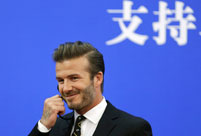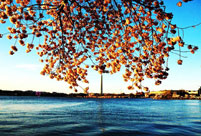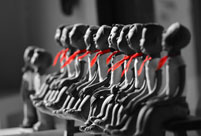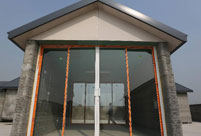 Luxury cars make Asia premiere at Auto China
Luxury cars make Asia premiere at Auto China
 Versatile dog
Versatile dog
 Ni Ni covers BAZAAR JEWELRY
Ni Ni covers BAZAAR JEWELRY
 Cherry blossoms reach peak bloom in Washington D.C.
Cherry blossoms reach peak bloom in Washington D.C.
 Top Chinese fashion icons in foreigners' eyes
Top Chinese fashion icons in foreigners' eyes
 Asia's largest business aviation exhibition to be held in Shanghai
Asia's largest business aviation exhibition to be held in Shanghai
 World's top-rated luxury hotels
World's top-rated luxury hotels
 Wu Jing, Xie Nan to hold wedding on May
Wu Jing, Xie Nan to hold wedding on May
 London Cake International attracts tourists
London Cake International attracts tourists
 Let's dance in harmonic Shaanxi
Let's dance in harmonic Shaanxi
BEIJING, April 22 -- Despite fresh protests from Beijing and Seoul, a Japanese cabinet minister and nearly 150 lawmakers on Tuesday paid homage to a war shrine, showing their infatuation with militarism and aggravating regional tensions.
With U.S. President Barack Obama's visit to Tokyo around the corner, the repeated shrine visits are also embarrassing for Obama and reflect the dwindling influence Washington has on Japan's right-wing politicians.
A response from Japan's neighbors or Washington over the shrine visit would be no surprise to Japan. Leader Shinzo Abe's visit late last year deeply soured Japan's relations with Asian neighbors and earned the country a diplomatic slap on the wrist from Washington, which said it was "disappointed" by the visit.
The shrine, which honors 14 WWII class-A war criminals, is a negative asset for Japan and has been repeatedly used by right-wing politicians to show their historical denialism and serve their goal of steering their country down a rightist path reminiscent of militarism.
The shrine visit is a provocation to Japan's neighbors, which fell victim to the country's aggression during WWII. The shrine has become a destructive factor in relations between Japan and its neighbors.
Rather than thoroughly reflecting on their view of history and correcting their acts, some Japanese right-wing politicians have resorted to double-faced tactics.
For example, politicians did not visit the shrine in person in order to avoid criticism from Washington and ensure the success of Obama's visit, but they dedicated trees or other offerings to the shrine with an aim to appease domestic right-wing forces.
The whole world should stay alert to some Japanese politicians' tactics and the country's future trend. It is in no country's interest to see Japan go down the rightist path.
It is fundamental for Japan to face up to and reflect on its history of militarist aggression and to make a clean break with militarism. The first step is to stop visits to the symbolic war shrine.
 Beckham launches fund to support youth soccer in China
Beckham launches fund to support youth soccer in China Cherry blossoms hit peak bloom in Washington D.C.
Cherry blossoms hit peak bloom in Washington D.C. Children in ancient costumes learn Zhusuan
Children in ancient costumes learn Zhusuan Tens of thousands celebrate Water Splashing Festival
Tens of thousands celebrate Water Splashing Festival A bite of China II whets the appetite
A bite of China II whets the appetite Chinese frigate completes its 14th escort mission
Chinese frigate completes its 14th escort mission Let's dance in wealthy Shaanxi
Let's dance in wealthy Shaanxi A date with 798: feel the art around you
A date with 798: feel the art around you 3D-printed houses built in Shanghai
3D-printed houses built in Shanghai The backstage of the Fashion Week
The backstage of the Fashion Week College students in Han costumes
College students in Han costumes Postgraduate works as waitress
Postgraduate works as waitress Life in a Lahu village in Yunnan
Life in a Lahu village in Yunnan An orphan’s wedding
An orphan’s wedding Hollywood documentary brings Diaoyu Islands truth to new audience
Hollywood documentary brings Diaoyu Islands truth to new audienceDay|Week|Month